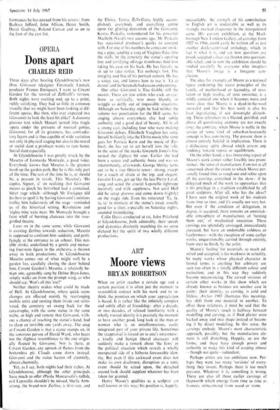Dons apart
OPERA CHARLES REID
Three days after hearing Glyndebourne's new Don Giovanni (designer Enianuele Luzzati, producer Franco Enriquez), I went to Covent Garden for the revival of Zeffirelli's version. Both nights were exciting and, up to a point, richly satisfying. They had so little in common visually that we might have been looking at dif- ferent operas. But then, who ever expected two Giovannis to look the least bit alike? A dramma giocoso text which Mozart turned into tragic opera under the pressure of musical genius, Giovanni, for all its greatness, has contradic- tory layers and is thus capable of wide variation not only in physical staging but also in the moral or social slant a producer wants to ram home. Social slant especially.
At Glyndebourne I was greatly struck by the Masetto of Leonardo Monreale, a good voice. Everybody knows that Masetto is the greatest boob up the garden path. But he is this only part of the time. The rest of the time he is, or should be, a peasant in revolt. This Masetto's 'Ho capito, Signor, si' on realising that Giovanni means to pinch his betrothed had a contained, bitter rage which—although Mr Enriquez did his best to spoil it by having Giovanni's minions trolley him ludicrously off the stage—reminded us of the historical setting. Revolution and 'eighty-nine were near. Mr Monreale brought a faint whiff of burning chateaux into the rose- girdled theatre.
Later on in the same scene, while Giovanni is coaxing Zerlina towards seduction, Masetto is supposed to confront him suddenly and petri- fyingly at the entrance to an arbour. This not- able stroke, underlined by a gentle and menac- ing four-note figure in the orchestra, is thrown away in both productions. At Glyndebourne Masetto conies out of what might well be a garden loo, carefully closing the door behind him. Covent Garden's Masetto, a relatively be- nign one, agreeably sung by Delme Bryn-Jones, simply walks on from the prompt wing, as who should say, Wot's all this 'ere?'
Neither theatre makes what could be made of Hell. At Glyndebourne, where quick scene changes are effected mainly by rearranging mobile units and turning them inside out retiti- vated, the cemetery set swung back for the catastrophe, with the same statue in the same niche, so high and remote that Giovanni, with- out a chance of reaching the statue's hand, had to clasp an invisible one yards away. The snag at Covent Garden is that a statue stumps on, in the sonorous person of David Ward, who bears not the slightest resemblance to the one origin- ally flouted by Giovanni. Nor is there, at Covent Garden, any uprush of flames from the bottomless pit. Clouds come down instead. Giovanni and the statue hasten off clammily, almost chummily.
Yet, as I say, both nights had their riches. At Glyndebourne, although the other principals have much to offer (Paolo Montarsolo's raffish, evil Leporello shouldn't be missed, Sheila Arm- strong, the brand-new Zerlina, is first-rate, and
the Elvira, Teresa Zylis-Gara, highly accom- plished), everybody and everything centre upon the glinting demonism of the Giovanni, Kostas Paskalis, remembered for his powerful Macbeth (Verdi) two seasons ago. Mr Paskalis has occasional producer's quirks to contend with. For one of his numbers he comes on smok- ing a pipe, sending a tang of Virginia flake into the stalls. In the cemetery the statue's opening line and terrifying offstage trombones find him taking his ease on his back. He has literally to sit up to take notice. Yet nothing's lost. 'The integrity and bite of his portrait remain. He has a voice, too, and knows how to use it. 41_a ci darem' and the Serenade had cream and cunning.
Our other Giovanni is Tito Gobbi, still the master. There are few artists who cock an eye- brow so satirically, woo more blandly or wriggle so deftly out of impossible situations. Although on Saturday night he had neither the volume nor penetration for the Hell scene, his singing almost everywhere else had subtle authority and a good deal of beauty. All in all a strong cast, including four who were making Giovanni debuts. Elizabeth Vaughan has sung. herself brilliantly into the Elvira music (the same goes for Patricia Kern and the music of Zer- lina); she has yet to act herself into the role. In the scene of the masks Gwyneth Jones's line turned the slightest bit sour. Earlier she had been a secure and authentic Anna and was so. intermittently, afterwards. George Shirley turns out to be a true Ottavio tenor: strong, except for a touch of strain at the top, and elegant. Geraint Evans, got up like the late Pierre Laval, sang and acted the crucial Leporello tightrope incisively and with suppleness. Not until Hell did he scrap giocoso and come down (rightly) on the tragic side. Even his reiterated 'Ta, ta, ta, ta' in mimicry of the statue's tread, usually good for a titter, especially on Saturday nights, sounded intimidating.
Colin Davis conducted at ca, John Pritchard at Glyndebourne, both admirably, their speeds and dynamics discreetly matching (in no sense dictated by) the spirit of two wholly different productions.






























 Previous page
Previous page